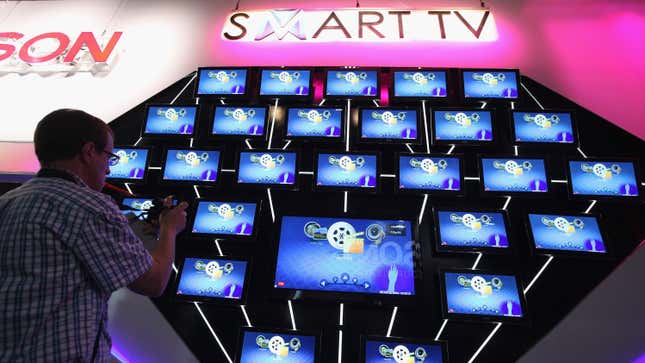
If you thought affordable TV giant Vizio was primarily a hardware company, you’d be wrong. At least in terms of where its money is coming from, Vizio is becoming an advertising firm.
That’s according to the company’s recent third-quarter earnings, which show its $57.3 million in gross profit from its Platform+ business segment (which includes advertising and viewer data) was nearly double the $25.6 million in gross profit it brought in from actual device sales. Those advertising profits marked a 88% year-over-year increase for the firm. Overall net revenues in the Platform+ segment meanwhile were up 134% compared to the same time last year.
In a world filled with iPhones going for well over a thousand dollars and $69 million NFTs, high-tech flat-screen televisions with some of the latest fancy features are often surprisingly affordable. Part of the reason those prices are so low is due to the rampant selling of user data by TV makers like Vizio.
As Insider notes, data collecting TV sets can be sold near cost to consumers, with manufacturers relying on viewer data collection and advertising to boost revenues. In many cases, smart TV makers can share a user’s approximate location, viewing habits, and engagement with advertising.
While those resulting low prices have made TVs more accessible than ever before, they come at the expense of user privacy, something yet to be well translated in terms of monetary value to consumers. In some cases, as this writer found out the hard way, good old-fashioned dumb TVs are actually more expensive than their data-siphoning smart cousins. In general, Dumb TVs are largely going extinct.
And advertisers have no shortage of rapid content viewers from whom they can suck out data. Smart TVs are already incredibly popular and are expected to be in 90% of North American households by 2024, according to data from research firm Strategy Analytics.
This offloading of costs away from hardware isn’t limited to just smart tv makers either. Roku, whose $30 bricks of plastic can turn virtually any TV into a smart device, is, in effect, an advertising company. In the second quarter of this year, Roku’s platform segment, which includes advertising revenues, raked in $532 million.
So yes, Vizio’s earnings show it’s essentially an advertising firm, but then again in a world where data is currency, so is almost everyone else.